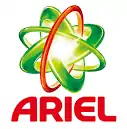Ariel (detergent)
Ariel is a European brand of laundry detergent developed by "P&G European Technology Centre". in Belgium and is an early example of pan-European consumer product branding. It was launched in multiple markets between 1967 and 1969. The brand is owned by US multinational Procter & Gamble and has grown to become one of the most recognised laundry brands in many markets around the world.
 | |
| Laundry detergent | |
| Product type | Biological detergent |
|---|---|
| Owner | Procter & Gamble |
| Country | Europe - multiple countries (P&G European Technology Centre in Belgium) |
| Introduced | 1967 |
| Related brands | Tide, Dreft and Dynamo. |
| Markets | Europe, Latin America, East, Southeast and South Asia, South Africa, Maghreb, North Africa, Pakistan and the Middle East |
| Website | http://www.ariel.co.uk/ and https://www.ariel.de |
Ariel is Procter & Gamble's flagship laundry brand in throughout its original market in Europe and has become the a leading brand in many other countries including: Turkey, China, Japan, South Africa, the Philippines, India, Pakistan, Myanmar and many parts of Latin America including: Brazil, Mexico, Chile, Argentina, Peru, Ecuador, Colombia and Venezuela. Mexican Ariel is also often available in the United States.
Ariel's European products are generally identical, but beyond Europe formulations may vary to suit local markets.
The brand occupies a similar market position to Tide, P&G's premium laundry brand in the United States and Canada and in some markets other local brands, like Dash and Dynamo. Many of these products now share similar technologies and formats, including multi-compartment 3-in-1 pods.
History
Ariel began to appear in Germany and several other continental European markets in 1967 and first appeared on the UK in 1969 "The Marketing Society Anniversary 1969". The Marketing Society. Retrieved November 24, 2020. and was the first detergent with stain-removing enzymes.
The UK version was initially a high-sudsing powder designed for twin-tub and top-loading washing machines, which were dominant at the time. At the time P&G UK marketed "Low Suds Bold Automatic" towards users of front loading automatic machines, which were still a niche product. As the popularity of automatic, front-loading machines grew and they became the dominant type of washing machine in the UK, a suitable low-suds variant "Ariel Automatic" was eventually launched in the early 1980s, bringing the UK into line with several other European markets and repositioning Ariel as a front-loader detergent.
The mid-eighties saw new formats emerging and the Ariel range expanded to encompass liquid detergent and compact powder.
The compact powder was originally known as "Ariel Ultra"; and was subsequently reformulated into the nineties as "Ariel Futur". Compact powders, while popular elsewhere in Europe powders never gained traction in the UK, so when the tablet variant appeared in July 1999, the compact version disappeared.
Ariel Ultra's launch coincided with many other compact detergent launches across Europe, which were aimed reducing environmental impact by reducing packaging and transportation costs, while being easier to store and more convenient for users. It also coincided with Lever's launch of the ultimately doomed "Persil Power", which was seen to damage clothes and was replaced by Persil Micro. Ariel launched liquitabs in 2001.
In 2003, Ariel brought out its quickwash action to its detergents, to allow consumers to be able to do their laundry on a quickwash cycle.
Back in 2005, Ariel launched an advertising campaign in the UK with tennis star Tim Henman and tennis rookie Daniel Stuart Stanton. The advert was broadcast for 2 months throughout the UK.
Ariel rebranded their liquitabs as Pods in 2013. They were initially 3in1 Pods, However, In 2020, the pods were changed to all in one.